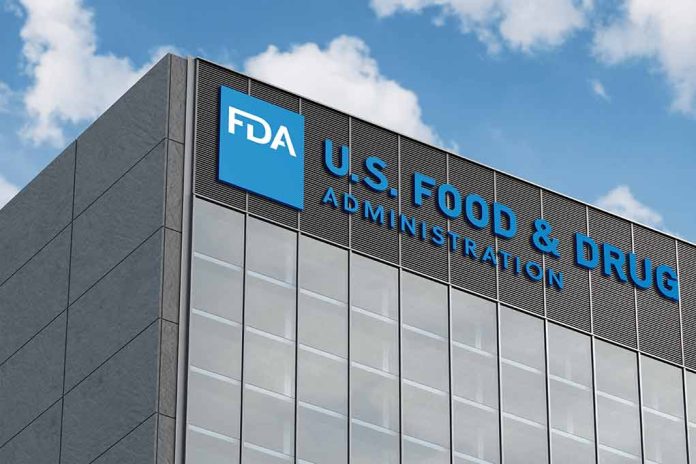
FDA greenlights lab-grown salmon for human consumption based solely on manufacturer’s safety claims, raising concerns over rushed approval and inadequate testing protocols.
Key Takeaways
- The FDA has approved Wildtype’s lab-grown salmon without independent verification, relying entirely on the company’s self-assessment of safety.
- Wildtype’s sushi-grade salmon, made from coho salmon cells grown in bioreactors, is now being served at Kann restaurant in Portland, Oregon with plans to expand to four more restaurants.
- Critics argue the approval process lacks transparency and proper testing, with no requirements for animal feeding trials before human consumption.
- Despite marketing claims of environmental benefits, some studies suggest lab-grown meats may have a higher global warming potential than traditional proteins.
- President Trump’s recent executive order to boost domestic seafood production aligns with this technological advancement, though questions about safety protocols remain.
FDA Approval Based Solely on Manufacturer’s Claims
In a concerning development for food safety, the FDA has approved Wildtype Foods’ lab-grown salmon based entirely on the company’s own safety assessment. The San Francisco-based cellular agriculture company received approval for its cultured salmon product without independent verification or public scrutiny of its claims. This marks the fourth lab-grown meat product to receive FDA approval in the United States, following earlier approvals for lab-grown chicken. Unlike other meat products, lab-grown seafood requires only FDA approval, not additional USDA oversight, making the agency’s reliance on self-reported safety data particularly troubling.
“foods comprised of or containing the cultured cellular material,” according to FDA.
Jaydee Hanson, a food safety expert, described the FDA’s approval process as “outrageous,” highlighting the complete absence of independent testing or public input. The company, backed by notable investors including Bezos Expeditions and Leonardo DiCaprio, submitted its initial safety documentation in June 2022, with the FDA issuing its “no questions” letter on May 28, 2025. This approval letter effectively declares the product “as safe as comparable foods produced by other methods” despite the lack of rigorous examination.
Production Process and Restaurant Debut
Wildtype’s production process involves growing coho salmon cells in steel vats using a proprietary nutrient blend. The company claims this method produces sushi-grade salmon that’s free from contaminants like mercury and microplastics commonly found in both wild-caught and farm-raised fish. The cultivated salmon made its public debut at Kann, a Portland, Oregon restaurant, where it will initially be available one night per week in June before expanding to daily service in July. The restaurant’s inaugural dish features the lab-grown salmon with pickled strawberry, spiced tomato, and an epis rice cracker.
“At Kann, we take pride in the ingredients we utilize. Introducing Wildtype’s cultivated salmon to our menu hits the elevated and sustainable marks we want our menu to offer guests who share a similar value system to ours,” said Gregory Gourdet
Wildtype emphasizes that its saku salmon is intended for raw consumption in dishes like sushi, crudo, and ceviche. The company plans to expand to four additional U.S. restaurants later this year, though retail availability is not yet planned. This rollout follows President Trump’s executive order from April 2025 aimed at boosting domestic seafood supply chains and reducing import dependence. The order specifically emphasized innovation in the seafood sector, potentially paving the way for these types of cellular agriculture products.
Safety Concerns and Environmental Claims
Despite industry celebration, serious questions remain about the FDA’s approval process. Critics point to the lack of transparency regarding production methods, including details about color additives and antibacterial products used in cultivation. Perhaps most alarming is the fact that Wildtype was not required to conduct animal feeding trials before selling to humans. This abbreviated approval process stands in stark contrast to the rigorous testing typically required for novel food products, raising questions about whether political priorities have overridden proper safety protocols.
“This letter concludes Wildtype Inc.’s consultation with the Food and Drug Administration regarding a cultured animal cell food product. We did not identify a basis for concluding that the production process… would be expected to result in food that bears or contains any substance or microorganism that would adulterate the food,” according to FDA.
Environmental claims about lab-grown meats also deserve scrutiny. While marketed as eco-friendly alternatives to traditional fishing and farming, a study from UC Davis suggests these products may actually have a higher global warming potential than conventional protein sources. This contradicts the sustainability narrative pushed by industry advocates. Additionally, several states have banned the sale of lab-grown meats altogether, reflecting growing skepticism about rushed approvals of these novel food technologies without adequate safety assurances and environmental impact assessments.
Industry Response and Future Outlook
Despite concerns, industry organizations like the Association for Meat, Poultry, and Seafood Innovation (AMPS) and the Global Cellular Agriculture Alliance (GCAA) have celebrated Wildtype’s achievement. Advocates argue that cultivated proteins can address contamination issues in traditional seafood while supporting domestic production. According to the Washington State Department of Health, “most of the salmon available for us to eat is farmed,” highlighting the potential market for alternatives. This technological advancement aligns with President Trump’s focus on strengthening domestic food security.
“Wildtype’s achievement is a watershed moment for domestic seafood production and for the cultivated protein industry overall. The thoughtful, evidence-driven review proves that innovative food technologies meet the highest safety standards, and can play a vital role in healthy American diets, while strengthening our food system’s domestic production and resilience, supporting the President’s executive order to expand seafood production in the USA,” said Dr Suzi Gerber
As more lab-grown products enter the market, questions about their long-term safety, nutritional profiles, and environmental impacts remain largely unanswered. While the FDA maintains a public inventory of completed cell culture consultations for transparency, the fundamental reliance on manufacturer-provided safety data represents a concerning precedent. Conservative consumers and health advocates alike should demand more rigorous testing protocols and independent verification before novel food technologies are widely adopted, particularly when they bypass traditional safety evaluations.







